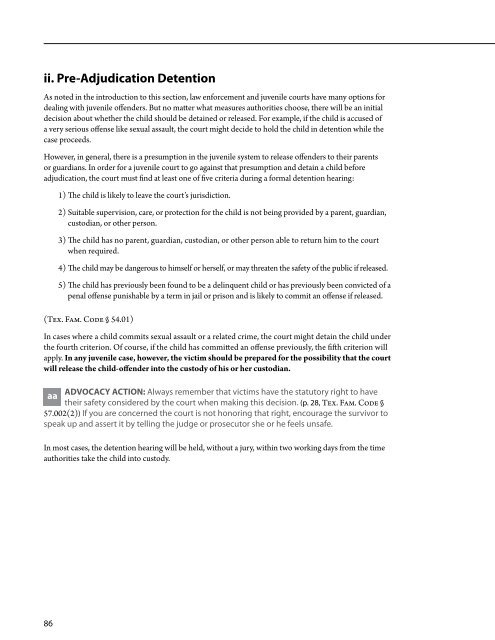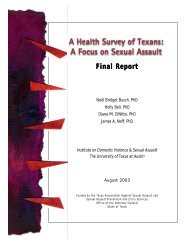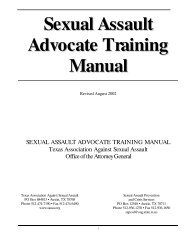Sexual aSSault LEGAL ADVOCACY MANUAL - Texas Association ...
Sexual aSSault LEGAL ADVOCACY MANUAL - Texas Association ...
Sexual aSSault LEGAL ADVOCACY MANUAL - Texas Association ...
You also want an ePaper? Increase the reach of your titles
YUMPU automatically turns print PDFs into web optimized ePapers that Google loves.
ii. Pre-Adjudication Detention<br />
As noted in the introduction to this section, law enforcement and juvenile courts have many options for<br />
dealing with juvenile offenders. But no matter what measures authorities choose, there will be an initial<br />
decision about whether the child should be detained or released. For example, if the child is accused of<br />
a very serious offense like sexual assault, the court might decide to hold the child in detention while the<br />
case proceeds.<br />
However, in general, there is a presumption in the juvenile system to release offenders to their parents<br />
or guardians. In order for a juvenile court to go against that presumption and detain a child before<br />
adjudication, the court must find at least one of five criteria during a formal detention hearing:<br />
1) The child is likely to leave the court’s jurisdiction.<br />
2) Suitable supervision, care, or protection for the child is not being provided by a parent, guardian,<br />
custodian, or other person.<br />
3) The child has no parent, guardian, custodian, or other person able to return him to the court<br />
when required.<br />
4) The child may be dangerous to himself or herself, or may threaten the safety of the public if released.<br />
5) The child has previously been found to be a delinquent child or has previously been convicted of a<br />
penal offense punishable by a term in jail or prison and is likely to commit an offense if released.<br />
(Tex. Fam. Code § 54.01)<br />
In cases where a child commits sexual assault or a related crime, the court might detain the child under<br />
the fourth criterion. Of course, if the child has committed an offense previously, the fifth criterion will<br />
apply. In any juvenile case, however, the victim should be prepared for the possibility that the court<br />
will release the child-offender into the custody of his or her custodian.<br />
<strong>ADVOCACY</strong> ACTION: Always remember that victims have the statutory right to have<br />
their safety considered by the court when making this decision. (p. 28, Tex. Fam. Code §<br />
57.002(2)) If you are concerned the court is not honoring that right, encourage the survivor to<br />
speak up and assert it by telling the judge or prosecutor she or he feels unsafe.<br />
In most cases, the detention hearing will be held, without a jury, within two working days from the time<br />
authorities take the child into custody.<br />
86
















